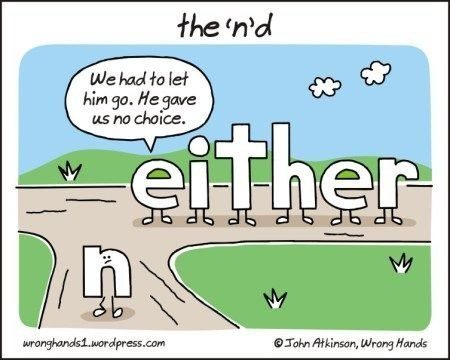|
Having trouble viewing this message? Click here to view it online.
To unsubscribe or change contact details, scroll to the bottom and follow the link.
|



|
|
Spacing after periods, colons, question marks, and exclamation marks
Originally, typewriters had monospaced fonts (skinny letters and fat
letters took up the same amount of space), so two spaces after ending
punctuation marks such as the period were used to make the text more
legible. However, most computer fonts present no difficulty with proportion
or legibility, so use just one space after a period, colon, question mark,
or exclamation point at the end of a sentence. You will not be struck by
lightning, we promise!
Quotation marks and punctuation
In several English-speaking countries other than the USA, a period used with
quotation marks follows logic.
Examples:
Myrtle said the word “darn”.
The period is outside the quotation marks because only the last word was
quoted, not the entire sentence.
Myrtle said, “I would never say that.”
The period went inside the quotation marks because this was Myrtle’s
entire statement.
Today, in American English usage, the period always goes
inside the quotation marks.
Example:
Myrtle said the word “darn.”
This does not follow logic, but it makes life easier for those of us who
have enough to think about besides punctuation.
Forming plurals in English
As time has gone on, we have shortened some words and dropped the former
plural form.
Example:
The words
memo and memos used to be memorandum and
memoranda.
With the word data, we no longer see the singular datum
used at all. Data is now often seen with both singular and plural
verbs, although the word is considered strictly plural by purists.
Examples:
The
data are being tabulated.
The
data is useful to the scientists.
Yet other words still retain their original spelling and plural form.
Example:
curriculum (singular) and curricula (plural).
Beginning sentences with but, and, because
In “the old days,” you may have been scolded for starting a
sentence with but, and, or because. But you
wouldn’t have deserved that scolding. If you start sentences with
these words, it’s usually a good idea to follow them with independent
clauses.
Examples:
But she would never say such a thing!
Because of this bee sting, my arm is swollen.
|
|
View this article on our website
|
|
Free BONUS Quiz for You!
Donna, because you are a subscriber to the newsletter, you get access to one of the Subscribers-Only Quizzes. Click here to take an Irregular Verbs Quiz and get your scores and explanations instantly!
We will be adding many more quizzes this year to our already substantial list of quizzes. If you have suggestions for topics we have not yet covered, please send us a message at help@grammarbook.com.
|
Hundreds of Additional Quizzes
at Your Fingertips
Subscribe now to receive hundreds of additional English usage quizzes not found anywhere else!
For Instructors and Employers, you may assign quizzes to your students and employees and have their scores tallied and organized automatically! Let GrammarBook.com take the hassle out of teaching English!
"Fun to test my Skills"
"The explanations really help ... thanks!"
"I download the quizzes for my students who don't have computer access."
|

|
Don't need all the quizzes?
You can now purchase the same quizzes individually for ONLY 99¢ each.
Purchase yours here.
|
If you think you have found an error in a quiz, please email us at help@grammarbook.com
|
 |
The Blue Book of Grammar and Punctuation
by Jane Straus, Lester Kaufman, and Tom Stern |
The Authority on English Grammar! Eleventh Edition Now Available
An indispensable tool for busy professionals, teachers, students, homeschool families, editors, writers, and proofreaders.
Available in print AND as an e-Book! Over 2,000 copies are purchased every month!
The publisher of The Blue Book, Jossey-Bass, A Wiley brand, is offering a 35 percent discount for those of you who order the book through Wiley.com. Shipping and tax are not included. Simply go to bit.ly/1996hkA and use discount code E9X4A.
Offer expires December 31, 2018.
|
Wordplay

|
 |
English In A Snap:
68 One-Minute English Usage Videos FREE |
Learn all about who and whom, affect and effect, subjects and verbs, adjectives and adverbs, commas, semicolons, quotation marks, and much more by just sitting back and enjoying these easy-to-follow lessons. Tell your colleagues (and boss), children, teachers, and friends. Click here to watch.
|
|